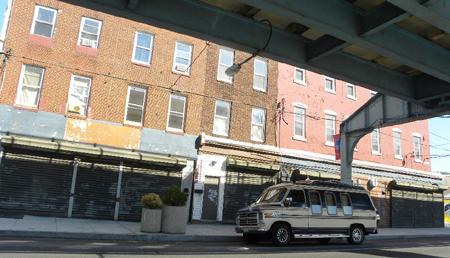- California Assembly OKs highest minimum wage in nation
- S. Korea unveils first graphic cigarette warnings
- US joins with South Korea, Japan in bid to deter North Korea
- LPGA golfer Chun In-gee finally back in action
- S. Korea won’t be top seed in final World Cup qualification round
- US men’s soccer misses 2nd straight Olympics
- US back on track in qualifying with 4-0 win over Guatemala
- High-intensity workout injuries spawn cottage industry
- CDC expands range of Zika mosquitoes into parts of Northeast
- Who knew? ‘The Walking Dead’ is helping families connect
Korean businesses in Manhattan closing doors as rent climbs

More and more Korean businesses are conceding defeat to rising rent prices and closing up in Manhattan. (Korea Times file)
In Midtown Manhattan, a Korean deli conceded defeat to rising rent prices after standing its ground through a recession. What had been $10,000 a month in rent money 10 years ago had grown to $45,000. It was time to give up the lease.
Another business, this one a dry cleaner located in the Upper East Side, experienced a similar hike. The landlord wanted a near-doubled rent after the completion of a nearby subway construction site.
“Even if you take into account higher dry cleaning costs over the last 10 years, we’re still only making a few dozen cents off each item. Doesn’t raising the rent so high mean that they just want us to leave?” the unnamed owner of the dry cleaner said.
They’re not alone — five Korean dry cleaners went out of business just last month, according to New York Dry Cleaners President Kim Sang-gyun.
“They can’t raise the amount during the period of the contracted lease so there’s less burden on tenants, but the problem arises when landlords request absurd rents during renewal,” Kim said. “Profit is already down because of increased labor, utility and supply costs, so the blow is huge when the rent increases.”
A large Manhattan nail salon recently gave up after its rent rose from $30,000 per month to $50,000.
“As rent prices rise, it’s become difficult to do big business in Manhattan,” said a source from the New York Korean Nail Association. “It’s impossible to risk the danger of starting a large-scale business with the burden of high real estate taxes as well.”
The association said landlords are looking to cast out existing tenants in order to increase the value of their properties as the economy slowly recovers.
Efforts to control rent in the city are underway, with a proposal to allow tenants priority on lease renewals with the presence of a mediator to negotiate rent amounts having been brought to the New York City Council.
“Another problem is that it’s difficult for businesses to continue in another location after they close down,” said Kim Sung-soo, co-founder of the Small Business Congress NYC. “Most landlords request key money in addition to raised rent. How could businesses start again with that burden? The rush of small businesses to leave New York will continue as their owners become unable to guarantee profit from being in the city.”















